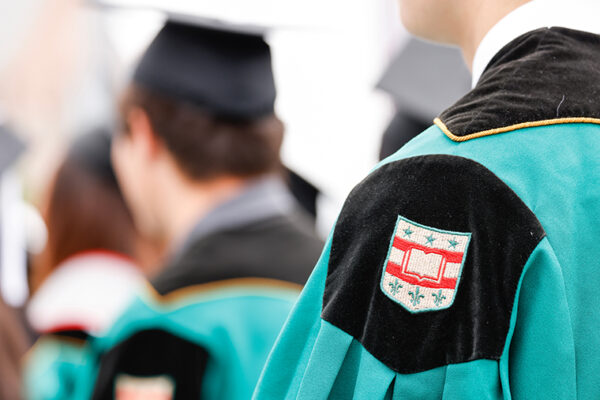Graduate student speaker Patricia Maurer, who earned a PhD in Germanic languages and literatures from Arts & Sciences, delivered her message to the Class of 2024 at Washington University in St. Louis during the May 13 Commencement ceremony on Francis Olympic Field.
Below are Maurer’s prepared remarks to the graduates.
Good morning, Class of 2024, administrators, faculty and loved ones.
Fellow graduates: Imagine if, instead of being on this stage, I were handing each of you a pair of glasses. Not ordinary ones, but lenses that suddenly let you see the invisible patterns woven through your own academic journey. Small victories and setbacks, frustrating obstacles, unexpected opportunities … they start to reveal a kind of path, a quest that is uniquely yours. As a literary scholar, I’ve dedicated much of my time here at WashU to understanding how stories are crafted, and I’ve come to see that our lives often unfold with similar, intriguing patterns. This is not a coincidence.
Think, for starters, of symbolism. In literature, a storm might not just be bad weather, but a sign of social or personal turmoil. In your life, think about that T-shirt with the WashU logo that you picked up on your first day as a student here. It’s not just a piece of clothing; it’s a symbol of your journey’s beginning, representing your entry into a community that has shaped you over these transformative years. Likewise, the diploma you are about to receive. It’s not just a piece of paper; it symbolizes your hard work, dedication and the knowledge you’ve gained. It marks both an ending and, as a passport to future opportunities and adventures, a new beginning.
Or think of foreshadowing — that nagging feeling before an exam that fulfills itself in a missed question you hoped would not be part of the test. Or when your professor hands out an awfully thick packet for you to read in the first week of the semester. You can sense what that packet means for your future; it’s a preview of the countless hours you’ll need to invest to succeed in the class.
Unreliable narrators also exist outside of novels. Ever convinced yourself that you’d remember something without writing it down? And then, at the crucial moment, your mind goes blank? Or when your brain convinces you that you can function on only five hours of sleep per night? Spoiler alert: You cannot. You, it turns out, have been your own unreliable narrator all along.
What about turning points? We’ve all had those moments when a chance encounter, a conversation, or a leap of faith shifts our course entirely. It might be the internship you almost didn’t apply for that opened the door to your dream field. Or the class you dreaded that ended up sparking an entirely new passion. The club you joined on a whim, leading to unexpected friendships and opportunities. These turning points are real-life plot twists where the story — your story — takes a new direction.
Character development? Forget what superhero movies tell you. Real growth is messy: it’s overcoming weaknesses and often learning things the hard way. It’s about evolving over time, learning from each stumble, and slowly building strength from what we’d rather forget. It’s the late realization that maybe, just maybe, procrastination isn’t an effective strategy after all.
And perspective? Well, that ability to step outside your own viewpoint is where real understanding begins. It’s about seeing beyond yourself, as in those lively classroom debates where conflicting views were not just clashes, but opportunities to build broader understanding. Just as multiple narratives enrich a story, different perspectives enrich our understanding and create new pathways to solutions.
Now, you might not have spent your college years analyzing literary texts as I did. But whether you were in a lab, at a mock trial, in rehearsal, in a StudioLab, or in the classroom, you’ve been experiencing and navigating these literary elements in your own ways. Every experiment that failed taught you something about the plot twist of the scientific process. Every client pitch honed your understanding of what makes a story or an idea compelling. Every thorny debate forced you to consider alternative perspectives. And those late nights working on a group project? That was a crash course in the collaborative nature of storytelling, where diverse voices can make the final product so much richer.
The world is filled with problems disguised as random chaos about which seemingly nothing can be done. The people who succeed, who create change, are the ones who can spot the underlying narrative and see where the story is leading. Maybe you’ll solve complex medical cases, design sustainable cities, revolutionize education … but whatever your field, you’ll be shaping narratives through your actions. And this isn’t a prewritten script you’re writing; you are, as you have always been, the author of the story of your life. Question the easy answers, seek out the voices pushed to the margins, understand the consequences of the stories being told about you, your community and our world.
As we go on from here and continue to think about our lives and shape it into a narrative from which we can generate meaning — something we all do, whether we’re aware of it or not — remember that your plot will have twists you never expected, and yes, chapters you wish you could skip. But don’t be afraid to embrace your role in the story. Look closely at the choices you make every day: toward what kind of ending are you building? Be relentless about seeking those alternative perspectives, recognizing the power of collaboration, and understanding that the most satisfying stories are rarely the easiest ones.
Congratulations, Class of 2024. Now let’s go make our lives stories worth telling.



